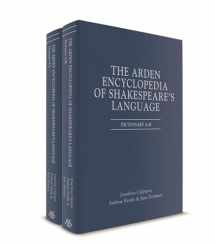
The Arden Encyclopedia of Shakespeare's Language
Book details
Summary
Description
The Encyclopedia of Shakespeare’s Language is a two-volume encyclopedia offering the first comprehensive account of Shakespeare’s language to use computational methods derived from corpus linguistics – methods of choice for today's lexicographer.
Volume 1 is a dictionary from A-M, focussing on the use and meanings of Shakespeare's words, both in the context of what he wrote and in the context in which he wrote. Every word is compared with a 321 million word corpus comprising the work of Shakespeare's contemporaries. The volume establishes in detail both what is unique about Shakespeare's language and what Shakespeare's language meant to his contemporaries, including, for example, their attitudes towards love or death, what it meant to be Welsh or a harlot, or even the significance of eating fish as opposed to beef.
Volume 2 is a dictionary from N-Z. As with the first volume, internal comparisons reveal how Shakespeare's language varies dynamically across his works. These show, for example, whether certain words are peculiar to tragedies, comedies or histories, and/or to certain social groups, such as people of high or low social rank, men or women, and they show the stylistic flavour of words, for example whether a word is literary or colloquial.


We would LOVE it if you could help us and other readers by reviewing the book
Book review



